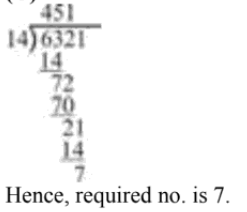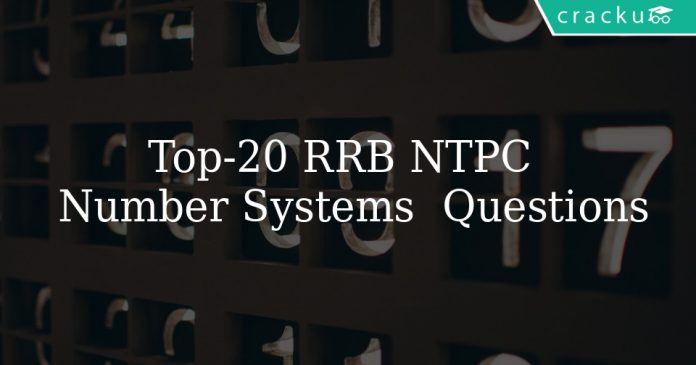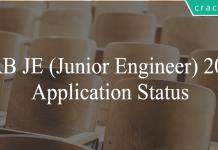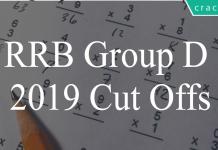RRB NTPC Number Systems Questions
Download Top-20 Number Systems questions for RRB NTPC exam. Most important Number Systems questions based on asked questions in previous exam papers for RRB NTPC.
Download Top-20 RRB NTPC Number Systems Questions
Get 20 RRB NTPC Mocks – Just Rs. 149
Take a free RRB NTPC mock test
Download RRB NTPC Previous Papers PDF
Question 1: Find the L.C.M. of 148 and 185
a) 680
b) 740
c) 2960
d) 3700
Question 2: Which of the following is a prime number ?
a) 33
b) 87
c) 93
d) 97
Question 3: The HCF and LCM of two numbers are 3 and 2730 respectively. If one of the numbers is 78, find the other number.
a) 107
b) 103
c) 105
d) 102
Question 4: Find the LCM of 15, 25 and 29.
a) 2335
b) 3337
c) 2175
d) 2375
Question 5: If R019 is divisible by 11, find the value of the smallest natural number R?
a) 5
b) 6
c) 7
d) 8
Question 6: Find the LCM of 25/7, 15/28, 20/21.
a) 300/7
b) 300
c) 320/23
d) 320
Question 7: The LCM of two numbers is 210. If their HCF is 35 and one of the numbers is 105, find the other number.
a) 35
b) 70
c) 105
d) 140
Question 8: If P713 is divisible by 11, find the value of the smallest natural number P?
a) 5
b) 6
c) 7
d) 9
Question 9: The LCM and HCF of 2 numbers are 168 and 6 respectively. If one of the numbers is 24, find the other.
a) 36
b) 38
c) 40
d) 42
Question 10: If x is an even number, what is the consecutive odd number?
a) x-1
b) x+1
c) x+2
d) x-2
Join Exam Preparation Telegram Group
Question 11: The HCF of two numbers is 4 and the two other factors of LCM are 5 and 7. Find the smaller of the two numbers.
a) 10
b) 14
c) 20
d) 28
Question 12: The HCF of two numbers is 6 and their LCM is 108. If one of the numbers is 12, then the other is
a) 27
b) 54
c) 48
d) 36
Question 13: What number should be deducted from 1265 to make it divisible by 29 exactly?
a) 15
b) 16
c) 18
d) 17
Question 14: Find the least number required to be added to 3105 so that it is exactly divisible by 3, 4, 5 and 6.
a) 95
b) 12
c) 11
d) 15
Question 15: The ratio of two numbers is 4 : 3 and their HCF is 8. Find their LCM.
a) 48
b) 96
c) 64
d) 84
Get 20 RRB NTPC Mocks – Just Rs. 149
Question 16: Find the largest number of three digits exactly divisible by 15, 18, 27 and 30.
a) 870
b) 900
c) 810
d) 780
Question 17: Find the LCM of the following fractions: 2/3 , 8/9 , 16/27, 32/81
a) 32/81
b) 81/32
c) 32/3
d) 11/41
Question 18: Sita starts to calculate sum of all odd natural numbersi less than 72. What result does she get’?
a) 1196
b) 1296
c) 1331
d) 1276
Question 19: Find the LCM of 3.2, 2.72, 1.28 and 1.44
a) 24.48
b) 2448
c) 97.92
d) 979.20
Question 20: What is the minimum number to be subtracted from 6321, which makes it completely divisible by 14?
a) 8
b) 12
c) 7
d) 11
Download RRB NTPC Previous Papers
Answers & Solutions:
1) Answer (B)
$148 = 2^2 \times 37$
$185 = 5 \times 37$
LCM = $ 2^2 \times 5 \times 37$ = 740
So , the answer would be option b)740
2) Answer (D)
From the given options, It can be observed that 97 is a prime number as other three numbers have factors other 1 & itself for them.
3) Answer (C)
$ HCF \times LCM = Product of two numbers$
Second number = $\frac{2730 \times 3}{78}$ = 105
So , the answer would be option c)105.
4) Answer (C)
15 = 3 $\times$ 5
25 = 5 $\times$ 5
29 is a prime number.
LCM = 3 $\times 5 \times 5 \times 29 $ =2175
So, the answer would be option c)2175
5) Answer (D)
Divisibility rule of 11 is:
sum of digits in odd place should be equal to sum of digits in even place or their differences should be divisible by 11.
here, $R+1=0+9=9$.
So, the smallest digit should be 8 .
So,$R= 8$.
D is correct choice.
6) Answer (A)
LCM of a fraction means
(LCM of numerator/HCF of denominatior).
here,
$25=5^2,15=5×3,20=5×2^2$
and $21=3×7,28=7×2^2$
So,LCM(25,15,20)=$5×3×2^2=300$
and
HCF(7,21,28)=7.
So, required LCM=(300/7).
A is correct choice.
7) Answer (B)
We know that multiplication of two numbers is equal to the multiplication of their LCM and HCF.
Here,LCM=210 and HCF=35 .
Let say ,another number is x.
So,$210×35=105 × x$
or,$x=(210×35)/105=70$
So, another number is 70.
B is correct choice.
8) Answer (D)
Divisibility rule of 11 :
sum of digits in odd place should be equal to sum of digits in even place or their difference should be a multiple of 11.
here ,sum of digits in odd place is(P+1)
and sum of digits in even place is 3+7=10.
So, P would get minimum value only when
P+1=10 or, P=9.
D is correct choice.
9) Answer (D)
$multiplication\ of\ two\ numbers=LCM\times HCF\ of\ these\ two\ numbers.$
here, LCM=168 and HCF=6 and one of the number is 24.
So,$other\ number\times24=168\times6.$
or,$other\ number=\frac{\left(168\times6\right)}{24}=42.$
So,D is correct choice.
10) Answer (B)
Let say,x=2, which is an even number.
So,next odd number is 3.
So, consecutive odd number appears in(x+1) form.
B is correct choice.
11) Answer (C)
Given that the H.C.F. of two numbers is 4 and the other two factors of the L.C.M are 5 and 7.
We are to find the smaller of the two numbers.
Let a and b be the two numbers where a < b.
Since the L.C.M. has three factors 4, 5 and 7 and H.C.F. of a and b is 4.
So, 4 is a factor of both the numbers a and b.
Also, 5 is a factor of one number and 7 is a factor of the other number.
The two numbers will be 5*4 and 7*4.
Thus, the two numbers are 20 and 28., and so the smaller number is 20.
12) Answer (B)
let the other numberbe x
As we know that
$lcm\times hcf$ = product of two numbers
$108\times 6$ = $12\times x$
x = 54
13) Answer (C)
Add three times the last digit to the remaining leading truncated number. If the result is divisible by 29, then so was the first number. Apply this rule over and over again as necessary.
$1265 ….126+(5+5+5)= 141$
$141 ….14 + (1+1+1) =17(here we not get 29 )$
so we deduct 18 and try
$1265 – 18 =1247 …..124+(7+7+7) =145$
$145 ….14 + (5+5+ 5) = 29$
so, 18 is the number
14) Answer (D)
$LCM of 3, 4, 5 and 6 = 2\times 3\times 2\times 5\times 1\times 1 = 60$
On dividing 60 with 3105, we get remainder 45
∴ Number to be added = 60 – 45 = 15
15) Answer (B)
Let the number be 3x and 4x
LCM*HCF=product of two numbers
8*LCM=3x*4x
LCM=$\frac{12x^2}{8}$
LCM=$\frac{3x^2}{2}$
LCM of 3x and 4x=12x
12x=$\frac{3x^2}{2}$
x=8
the number be $3\times 8$ and $4\times 8$ = 24,32
LCM=(24,32) = 96
Get 20 RRB NTPC Mocks – Just Rs. 149
16) Answer (C)
we have to find lcm of the numbers
15 = $3\times 5$
18 = $2\times 3\times 3$
27 = $3\times 3\times 3$
30= $2\times 3\times 5$
so, lcm = $2\times 3\times 3\times 3\times 5$
= 270
so, 810 is the only number divisible by 270
17) Answer (C)
LCM of fractions is LCM of the numerators divided by HCF of denominators.
LCM (2, 8, 16, 32) = 32
HCF (3, 9, 27, 81) = 3
So LCM (2/3, 8/9, 32/81) = 32/3
18) Answer (B)
Odd natural numbers less than 72 = 1, 3, 5, 7, 9…….71
Here, a = 1 and common difference = 2
Number of terms = n
And nth term is 71.
So,
71= a + (n – 1)d
⇒ 71 = 1 + (n – 1)2
⇒ 71 – 1 = 2n – 2
⇒ 70 + 2 = 2n
⇒ n = 72/2
⇒ n = 36
Now, sum of n number of terms = Sn = n/2{2a +(n – 1)d}
$S_{36} = 36/2 \times ({{2 \times1 + (36 -1)2}})$
$= 18 \times ({2 + (35\times2)})$
$= 18\times72$
1296
19) Answer (D)
To solve this type of problems we have to follow the below steps.
Step I: Convert each of the decimals to like decimals.
Step II: Remove the decimal point and find the least common multiple (LCM) as usual.
Step III: In the LCM, put the decimal point as there are a number of decimal places in the like decimals.
LCM of 3.2, 2.72, 1.28 and 1.44
Step I: Like decimals are 3.2, 2.72, 1.28 and 1.44
Step II: LCM of 32/10, 272/100, 128/100 and 144/100 = LCM(32, 272, 128, 144) = 97920
Step III: LCM of 3.2, 2.72, 1.28, 1.44 = 979.20
∴ LCM of 3.2, 2.72, 1.28, 1.44 = 979.20
20) Answer (C)
A number is divisible by 14 only when it is divisible by both the factor of 14 i.e 7 and 2
we know a number is divisible by 2 when the last digit of the number is even
we also know that a number is divisible by 7 when the double of last two digits of the number, when subtracted by the remaining number gives 0 or different multiple of 7
so if we subtract 7 from the number we get an even number and a number divisible by 7 hence making the number divisible by 14






